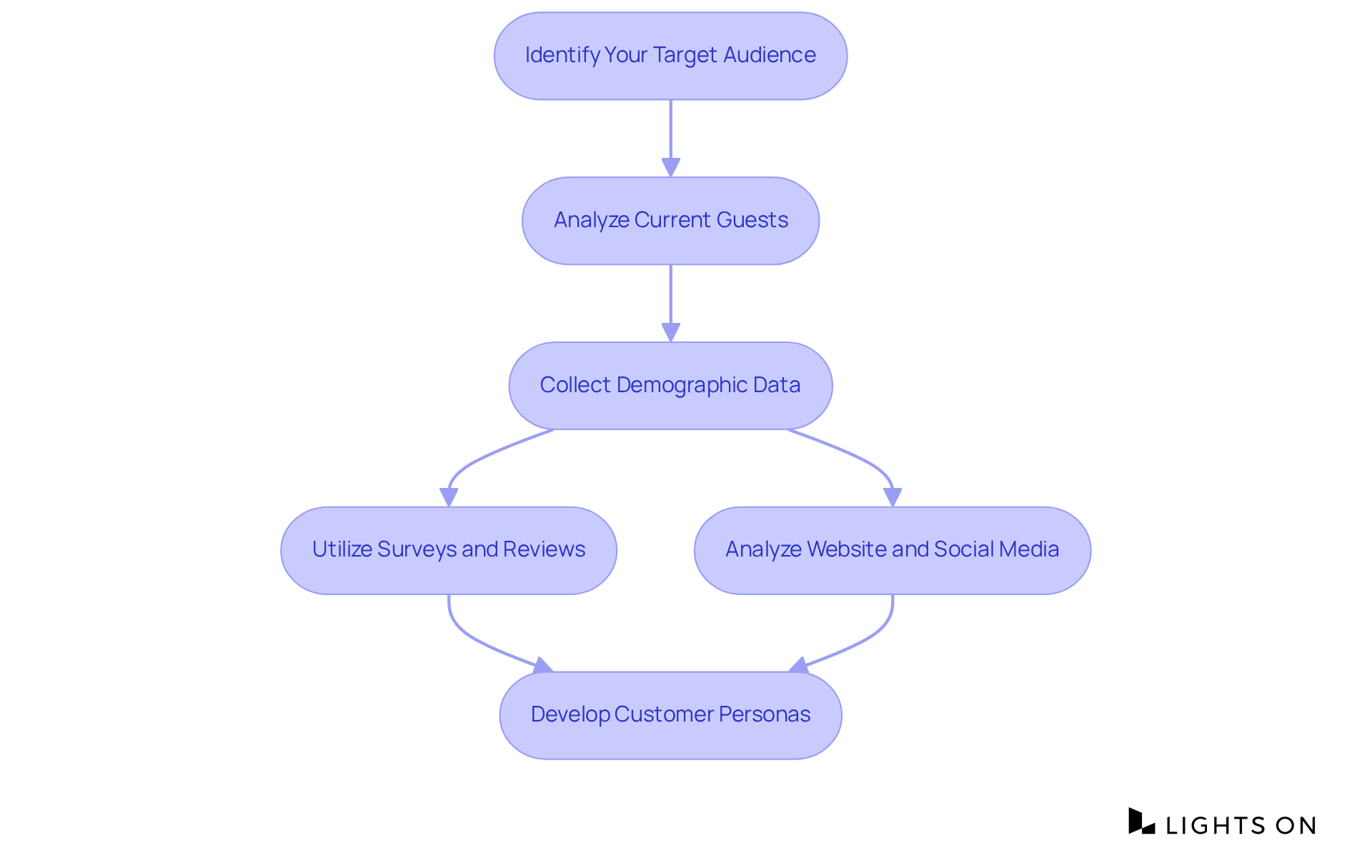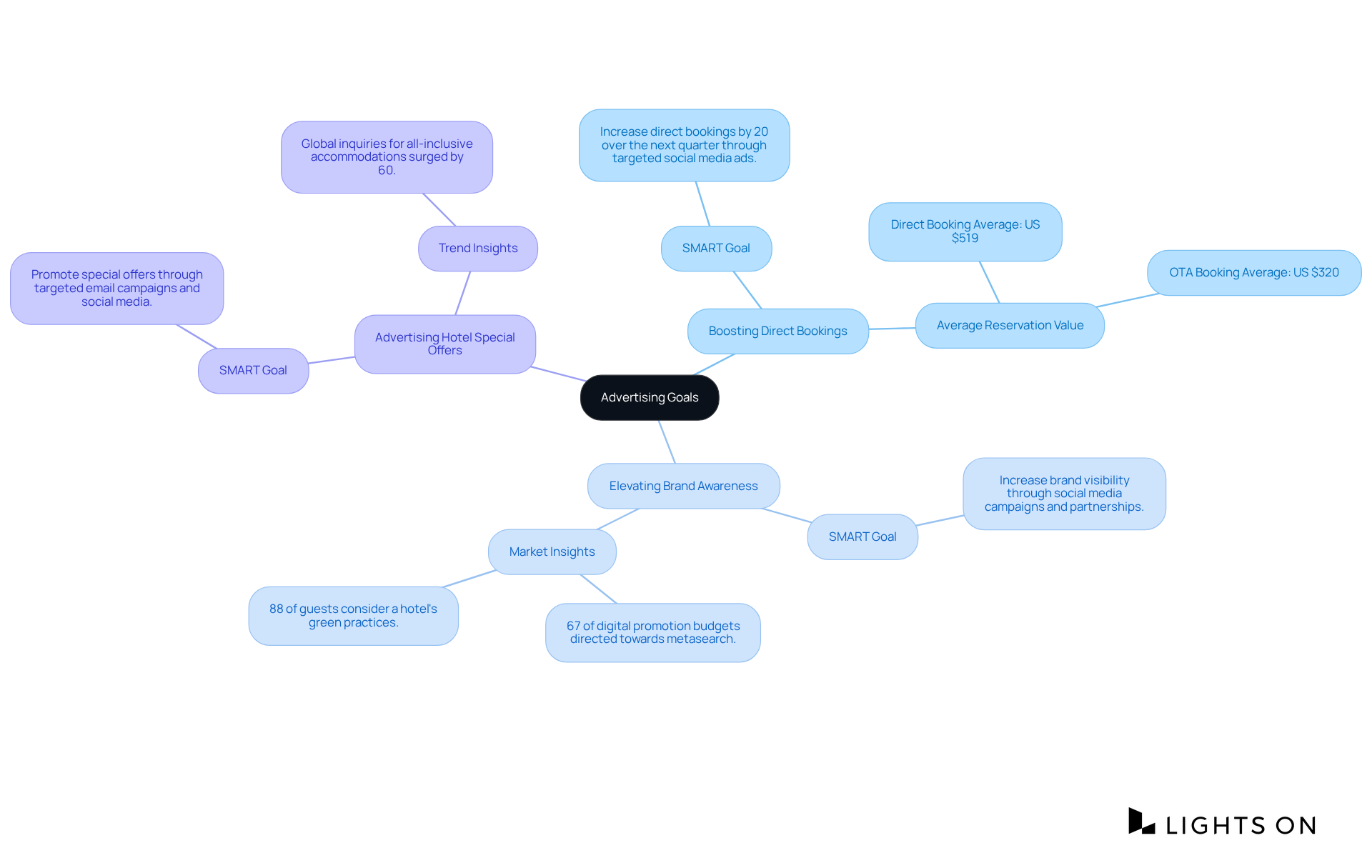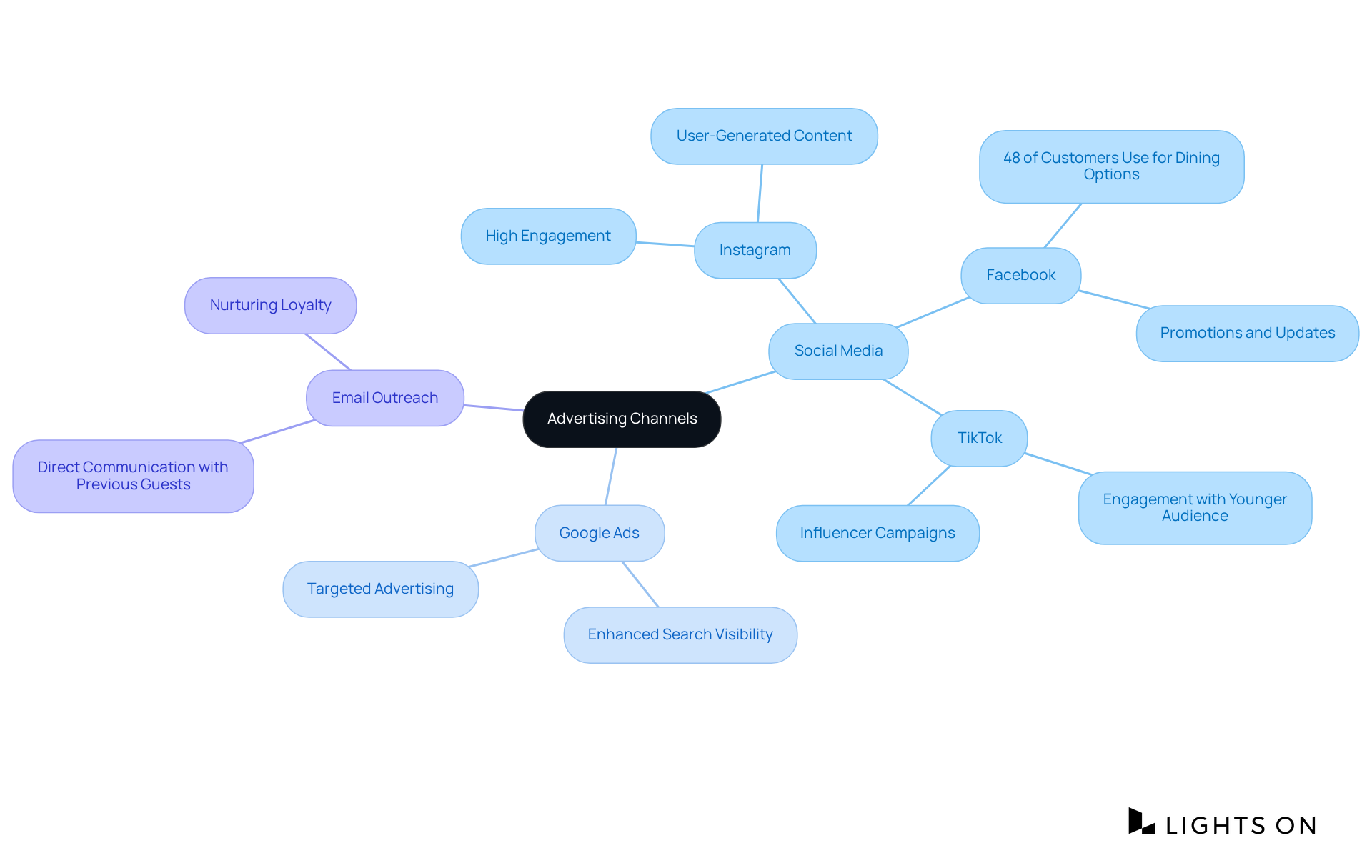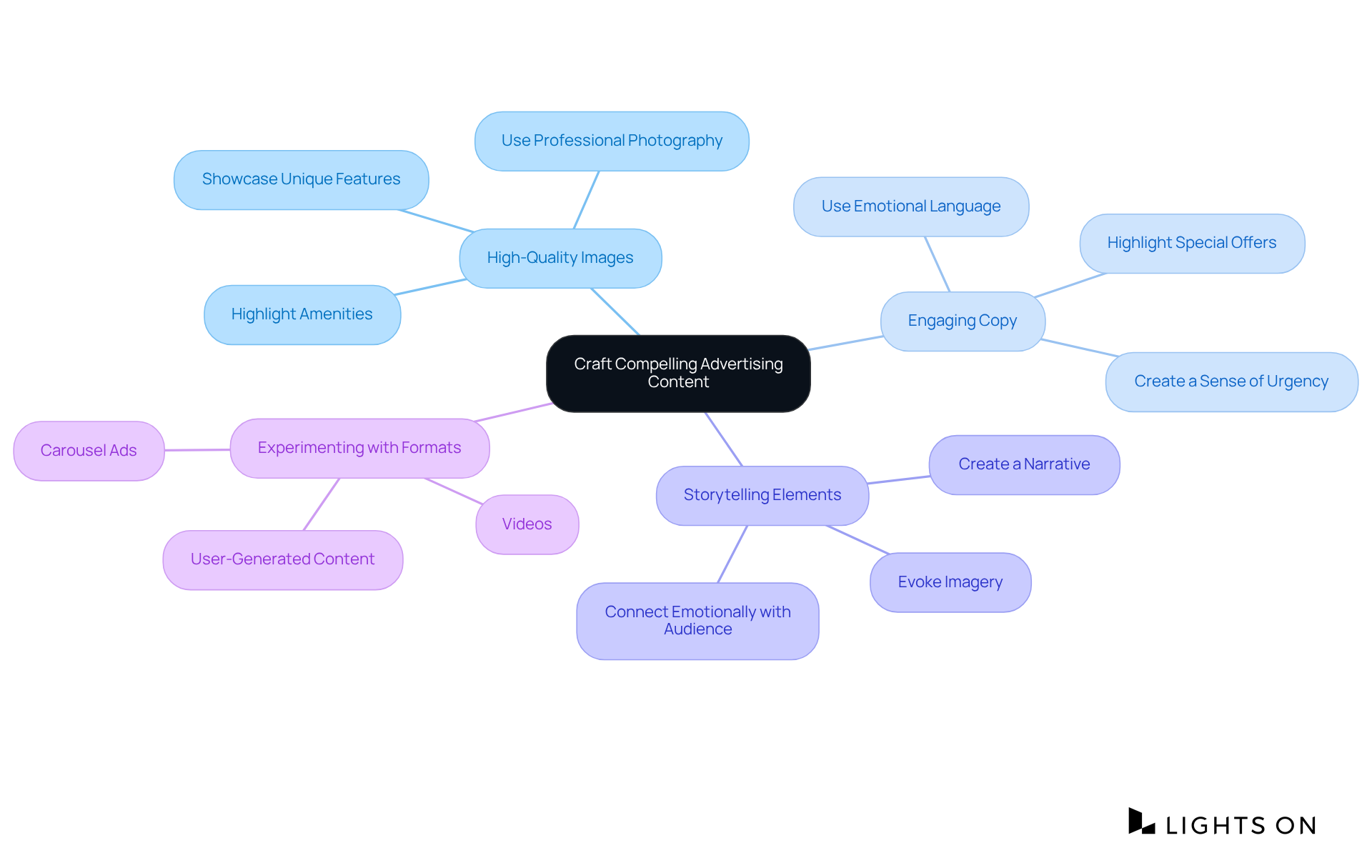The article delineates five essential steps for effectively advertising hotel services:
Each step is underpinned by strategic insights and data, underscoring the significance of personalized marketing, clear objectives, and ongoing analysis. This approach not only enhances engagement but also ultimately drives an increase in bookings.
In today's competitive hospitality landscape, the effective advertising of hotel services has become increasingly crucial. Understanding the nuances of target demographics and leveraging appropriate channels allows hotels to significantly enhance their visibility and attract a larger number of guests. However, with countless strategies at their disposal, how can establishments determine which methods will yield the best results? This article explores five essential steps that not only clarify advertising goals but also equip hotels with the necessary tools to captivate and convert potential customers.
Identifying your target audience starts with a thorough analysis of your current guests. Utilize tools such as surveys, online reviews, and feedback forms to collect , including age, gender, and travel preferences. Furthermore, harness analytics from your website and social media platforms to gain insights into who interacts with your content.
Developing comprehensive customer personas—such as 'Business Traveler Bob' or 'Family Vacationer Sarah'—will enable you to customize your promotional messages to align with their unique needs and preferences. This targeted approach not only enhances engagement but also increases the likelihood of converting interest into bookings.
As Florie Thielin, a digital marketing expert, emphasizes, understanding potential customers is crucial for developing effective communication and marketing strategies that resonate with diverse market segments.

Begin by clearly outlining your objectives for promotional campaigns. Common goals often include:
Utilize the SMART framework to articulate these goals with precision. For instance, rather than simply stating 'increase bookings,' specify 'increase direct bookings by 20% over the next quarter through targeted social media ads.' This level of clarity will guide your promotional strategies and enable effective measurement of success. Notably, on an establishment’s website average US $519, compared to US $320 through OTAs, underscoring the financial impact of precise goal-setting.
Additionally, with global inquiries for all-inclusive accommodations surging by 60%, establishments should consider incorporating this trend into their promotional objectives. As hospitality promotion expert Frank DePino notes, 'Adopting intelligent, data-driven strategies can provide your brand a competitive advantage and enhance profitability.' Furthermore, 67% of accommodation digital promotion budgets are directed towards metasearch, highlighting the importance of data-driven insights in refining promotional goals. By explicitly defining your promotional objectives, you position your establishment for success in a competitive landscape.

Selecting the right advertising channels is crucial for optimizing your establishment's marketing effectiveness. Social networking sites, such as Instagram and Facebook, serve as ideal platforms for showcasing visually appealing content, allowing hotels to engage with potential guests through captivating images and videos. Notably, 48% of customers turn to social networks when searching for dining options, and 53% of individuals aged 18 to 24 utilize these platforms for similar inquiries. Leveraging social networks can significantly enhance visibility and attract younger travelers. As Nauman emphasizes, social platforms have evolved into indispensable resources for the hospitality sector, reshaping how businesses interact with their audience.
In addition to social media, consider employing Google Ads to effectively advertise your hotel and enhance search visibility, ensuring that it stands out when prospective guests are seeking accommodations. Email outreach continues to be a powerful method for direct communication with previous guests, nurturing loyalty and promoting repeat bookings.
Regularly assessing the performance of each channel is essential for refining your strategy. For example, if Instagram advertisements demonstrate higher engagement rates, reallocating a larger portion of your budget to that platform may prove beneficial. By consistently monitoring metrics such as likes, shares, and comments, you can tailor your content to resonate with your audience, ultimately boosting bookings and helping to advertise your hotel. Moreover, maintaining a consistent posting schedule across various platforms and encouraging user-generated content can further enhance your promotional efforts, as customers inherently endorse the brand by sharing their experiences.

To develop compelling promotional material to advertise the hotel, it is essential to highlight what distinguishes your establishment. Utilize and engaging copy that showcase special offers, unique experiences, or exceptional service. Incorporate storytelling elements to forge an emotional connection with your audience.
For instance, instead of merely stating, 'we have a pool,' evoke imagery by saying, 'dive into relaxation at our stunning rooftop pool with breathtaking views.' This approach not only captivates potential guests but also enhances their desire to experience your offerings.
Experiment with various formats, such as videos or carousel ads, to determine which resonates most effectively with your audience. Furthermore, successful campaigns that advertise hotel offerings often leverage unique selling propositions, making storytelling a vital component in marketing strategies.

To effectively monitor promotional performance, establishing key performance indicators (KPIs) such as click-through rates (CTR), conversion rates, and return on ad spend (ROAS) is essential. Utilizing like Google Analytics and social media insights facilitates comprehensive data collection on ad performance. Regularly reviewing this data enables the identification of trends and areas for improvement.
For instance, if a specific ad is underperforming, a detailed analysis of its content and audience targeting can reveal necessary adjustments. This iterative process not only enhances advertising strategies but also contributes to overall revenue growth, as evidenced by a 24% increase in revenue linked to optimized advertising efforts.
Furthermore, focusing on KPIs such as Occupancy Rate (OCC), Average Daily Rate (ADR), and Revenue Per Available Room (RevPAR) provides a more comprehensive perspective on performance. By establishing clear strategic objectives prior to planning campaigns, accommodations can ensure their investments yield the best possible returns.
Implementing effective hotel marketing strategies, such as targeted promotions and leveraging social media, can further enhance bookings and revenue management, which are essential when you advertise hotel offerings, aligning with insights from Lights On Digital.
![]()
Identifying and implementing effective strategies for advertising hotel services is essential for success in the competitive hospitality industry. Understanding your target audience, defining clear advertising goals, selecting the right channels, crafting compelling content, and implementing performance tracking are critical steps that can significantly enhance a hotel’s visibility and appeal to potential guests.
Throughout this article, we outlined key steps to create a robust advertising strategy. These include:
Each of these elements plays a crucial role in driving bookings and maximizing revenue.
Ultimately, the significance of a well-rounded advertising approach cannot be overstated. By embracing these strategies, hotels can attract more guests and foster lasting relationships that encourage repeat visits. As the hospitality landscape continues to evolve, staying ahead of trends and leveraging data-driven insights will be vital for achieving long-term success in hotel marketing. The time to implement these best practices is now, ensuring that your establishment remains competitive and relevant in the ever-changing marketplace.
How can I identify my target audience for promotional campaigns?
You can identify your target audience by analyzing your current guests through surveys, online reviews, and feedback forms to collect demographic data such as age, gender, and travel preferences. Additionally, use analytics from your website and social media platforms to gain insights into who interacts with your content.
What is the benefit of developing customer personas?
Developing customer personas, such as 'Business Traveler Bob' or 'Family Vacationer Sarah,' allows you to customize your promotional messages to meet their unique needs and preferences. This targeted approach enhances engagement and increases the likelihood of converting interest into bookings.
Why is understanding potential customers important?
Understanding potential customers is crucial for developing effective communication and marketing strategies that resonate with diverse market segments, as emphasized by digital marketing expert Florie Thielin.
What should I consider when defining my advertising goals?
When defining your advertising goals, clearly outline your objectives for promotional campaigns, such as boosting direct bookings, elevating brand awareness, or advertising hotel special offers.
How can I use the SMART framework for goal-setting?
Utilize the SMART framework by articulating your goals with precision. For example, instead of saying 'increase bookings,' specify 'increase direct bookings by 20% over the next quarter through targeted social media ads.' This clarity will guide your promotional strategies and enable effective measurement of success.
What is the financial impact of direct bookings compared to OTAs?
Reservations made directly on an establishment’s website average US $519, compared to US $320 through Online Travel Agencies (OTAs), highlighting the financial benefits of precise goal-setting.
What trends should I consider when setting promotional objectives?
Consider incorporating trends such as the 60% surge in global inquiries for all-inclusive accommodations into your promotional objectives, as noted by hospitality promotion expert Frank DePino.
How is digital promotion budget allocated in the hospitality industry?
Approximately 67% of accommodation digital promotion budgets are directed towards metasearch, emphasizing the importance of data-driven insights in refining promotional goals.
Transform your group booking strategies with Lights On and watch your occupancy soar.